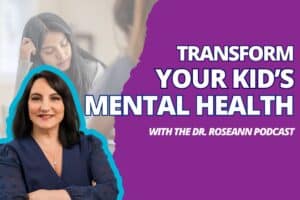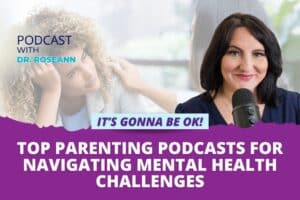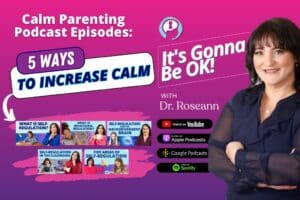Obsessive compulsive disorder (OCD) is when your child's brain gets stuck on the repeat button, obsessively replaying certain thoughts and behaviors. There are different subtypes of OCD, and Just Right OCD is another subtype or specific manifestation, where one can't tolerate feelings of imperfection.
In people with Just Right OCD, obsessive thoughts and compulsive behaviors are often centered around achieving a sense of things being “just right” or perfect according to a person's internal standards or rituals.
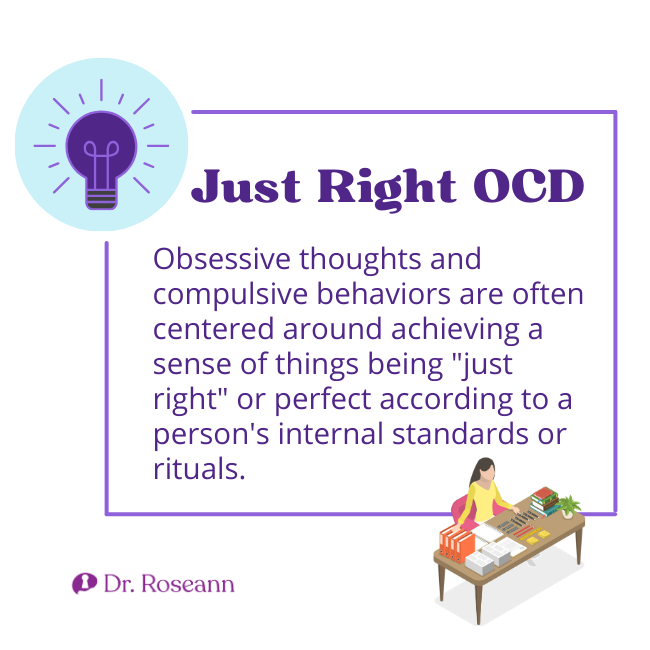
In this form of OCD, children and teens may feel intense discomfort or anxiety if things are not arranged or done in a specific way. They might engage in rituals or repetitive behaviors to achieve a sense of perfection or to alleviate the distress associated with the uncomfortable feelings that something is not quite right.
I recall working with Jaime who until I observed in class, we didn’t know how much her perfectionism was wreaking havoc on her life. She was so worried about her schoolwork being “perfect” that she would write and erase over and over. At recess, Jaime was so worried about her performance that she wouldn’t interact with the other kids and walk in circles around the perimeter.
Such mental acts could include repetitive checking, arranging objects in the right place or particular order, and performing specific actions until they feel that things are “just right.” (Coles & Ravid, 2016)
Uncomfortable Feelings During the Quest for Perfection
Also referred to as Perfectionism OCD, the quest for perfection in Just-Right OCD is not a mere desire. It's an unrelenting force that shapes thoughts and actions. Children and teens with this subtype may find themselves caught in a perpetual loop where they strive to achieve a sense of order and break free from the feelings of incompleteness in satisfying an internal set of rules.
Living with this subtype of OCD is like walking a tightrope suspended between two worlds – the external reality and the internal landscape governed by an ever-demanding need for perfection. The compulsion to make things “just right” and the recognition that the pursuit may be never-ending.
Just Right OCD Symptoms and Its Comorbidities
There’s a connection between ‘Just Right' OCD and tic disorders, which involve involuntary movements and vocalizations that often accompany the quest for perfection. Tic disorders are characterized by sudden, rapid, and repetitive movements or vocalizations.
These can be motor tics, which involves physical movements; or vocal tics, which manifest as sounds or words. In the context of ‘Just Right' OCD, individuals may find themselves choreographing involuntary movements or vocal expressions as part of their quest for perfection (Kostek et al., 2016).
Also beneath the surface of this OCD lies the shadow of anxiety disorders. The key difference between the two is the source of anxiety, which further emphasizes the importance of addressing the typical OCD symptoms with effective behavioral strategies.
Anxiety, like an invisible current, flows beneath the intrusive thoughts and behaviors associated with most OCD subtypes. The fear of imperfection, the compulsive rituals to achieve a ‘just right' state, and the constant uncertainty are fertile grounds for anxiety disorder to flourish.
The Impact on Daily Life
The impact of “Just Right” OCD reverberates through various aspects of daily life. Routine tasks become elaborate rituals, and the need for perfection can infiltrate even the most mundane activities.
From meticulously aligning objects to repeating actions until they meet an internal standard, individuals with Just Right OCD experience feeling trapped in a web of compulsions that, paradoxically, fails to bring the lasting satisfaction they seek.
Underneath the facade of order and perfection lies a tumultuous emotional landscape. Anxiety, frustration, and a constant sense of unease accompany the pursuit of the “just right” state. Understanding and navigating this emotional rollercoaster is a crucial aspect of supporting individual needs associated with this mental illness or disorder such as OCD, as they strive to find a delicate balance in a world that often feels overwhelmingly chaotic.
Breaking the Chains of Perfection
While “Just Right” OCD presents its unique challenges, there is hope and support available. Breaking the chains of perfection begins with acknowledging the nature of the disorder and seeking professional guidance. Cognitive-behavioral therapy (CBT) has shown effectiveness in OCD treatment, helping individuals challenge and change their patterns of thought and behavior.
Mindfulness-based approaches, such as Acceptance and Commitment Therapy (ACT), can also be valuable in cultivating a more accepting and flexible mindset. Embracing uncertainty and learning to tolerate discomfort are pivotal steps in untangling the web of “Just Right” OCD.
The use of Selective Serotonin Reuptake Inhibitors (SSRIs) should never be the first line of treatment for OCD symptoms or any other mental health conditions in a child. The best treatment plan for OCD is Exposure and Response Prevention therapy (ERP) and Cognitive Behavioral Therapy where the child will be gradually exposed to stimuli until they can better manage their compulsions and obsessions.
OCD Treatment and the Power of Support
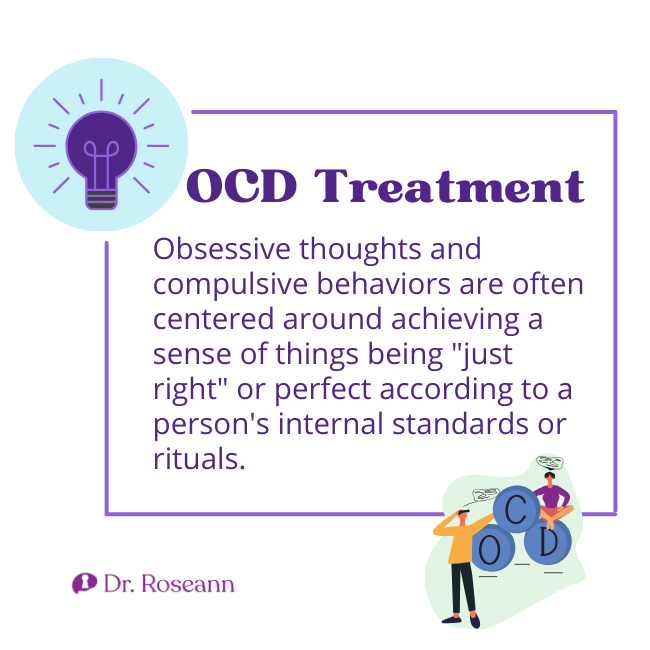
Support plays a pivotal role in the journey of managing “Just Right” OCD. Friends, family, and mental health professionals can provide a crucial safety net, offering understanding, empathy, and encouragement.
Building a support network creates a space where individuals with these kinds of OCD can share their experiences and common obsessions, express their struggles, and receive the validation that is essential in breaking free from the constraints of perfection.
Ultimately, the path to harmony lies in embracing imperfection. “Just Right” OCD may create an illusion that perfection is attainable, yet the true beauty of life often lies in its imperfections.
Recognizing that perfection is an unattainable ideal and learning to find satisfaction in the imperfect moments is a transformative step toward breaking free from the uncomfortable feeling associated with high levels of anxiety.
Finding Harmony in Imperfection
In “Just Right” OCD, the pursuit of perfection may seem like an unending symphony. Yet, within this complexity lies the potential for growth, resilience, and a newfound appreciation for the imperfect beauty of life.
Understanding, supporting, and embracing imperfection, children and teens with “Just Right” OCD can embark on a journey toward harmony. Parents should help them break free from the chains that bind them to the elusive quest for that just right feeling and make their day-to-day lives easier through natural therapies and solutions, like the BrainBehaviorResetTM Program.
Jaime was an OCD recovery success story because her parents didn’t wait for things to work out their own. With a combination of PEMF and exposure and response prevention OCD therapy, Jaime was able to completely eliminate her OCD behaviors.
Parent Action Steps
☐ Create a safe space for your child to share their significant distress and most common compulsions.
☐ Consult with mental health professionals specializing in obsessive-compulsive disorder.
☐ Consider natural treatments like ERP therapy to address common triggers.
☐ Cultivate a supportive home environment with every family member acknowledging the overwhelming fear related to different forms of OCD.
☐ Cultivate a mindset that embraces the feeling of incompleteness or imperfection and teaches children that mistakes are opportunities for growth and self-compassion.
☐ Take the OCD Quiz to get evidence-based treatments for your child.
☐ Use the Solutions Matcher for individualized solutions for Just Right OCD symptoms.
Citations
Coles, M. E., & Ravid, A. (2016). Clinical presentation of not-just right experiences (NJREs) in individuals with OCD: Characteristics and response to treatment. Behaviour Research and Therapy, 87, 182–187. https://doi.org/10.1016/j.brat.2016.09.013
Huey, E. D., Zahn, R., Krueger, F., Moll, J., Kapogiannis, D., Wassermann, E. M., & Grafman, J. (2008). A psychological and neuroanatomical model of obsessive-compulsive disorder. The Journal of neuropsychiatry and clinical neurosciences, 20(4), 390–408. https://doi.org/10.1176/jnp.2008.20.4.390
Kostek, N. T., Garcia-Delgar, B., Rojas, A., Luber, M., & Coffey, B. J. (2016). Approaches to the Diagnosis and Treatment of OCD with Comorbid Tic Disorders. Current Treatment Options in Psychiatry, 3(3), 253–265. https://doi.org/10.1007/s40501-016-0091-8
Dr. Roseann is a mental health expert who frequently is in the media:
- Insider: What is OCD?
- What to Expect: Why Does My Toddler Keep Pulling Her Own Hair?
- Parade: Why Does My Toddler Keep Pulling Her Own Hair?
- Single Care Controlling the uncontrollable: Living with OCD during a pandemic
- MomsCove How to Help a Child with Anxiety and OCD
- Holistic Counseling Podcast: Effective Treatments for OCD
- Epidemic Answers: Neurofeedback for ADHD, anxiety, OCD and mood
- Cai Grahm: Is it anxiety or OCD?
- BCIA: Calming the OCD Brain with Neurofeedback and ERP Therapy
- Hope for Anxiety and OCD: Sudden Onset OCD
- Integrative Practitioner: Integrative Approaches to Treating OCD
- HappiHuman: Is it an Eating Disorder or OCD
Are you looking for SOLUTIONS for your struggling child or teen?
Dr. Roseann and her team are all about science-backed solutions, so you are in the right place!
Grab your complimentary copy of
147 Therapist-Endorsed Self-Regulation Strategies for Children: A Practical Guide for Parents
You can get her books for parents and professionals, including: It’s Gonna Be OK™: Proven Ways to Improve Your Child’s Mental Health, Teletherapy Toolkit™ and Brain Under Attack: A Resource For Parents and Caregivers of Children With PANS, PANDAS, and Autoimmune Encephalopathy.
If you are a business or organization that needs proactive guidance to support employee mental health or an organization looking for a brand representative, check out Dr. Roseann’s professional speaking page to see how we can work together.
Dr. Roseann is a Children’s Mental Health Expert and Licensed Therapist who has been featured in/on hundreds of media outlets including The Mel Robbins Show, CBS, NBC, PIX11 NYC, Today, FORBES, CNN, The New York Times, The Washington Post, Business Insider, Women’s Day, Healthline, CNET, Parade Magazine and PARENTS. FORBES called her, “A thought leader in children’s mental health.”

She coined the terms, “Re-entry panic syndrome” and “eco-anxiety” and is a frequent contributor to media on mental health.
Dr. Roseann Capanna-Hodge has three decades of experience in working with children, teens and their families with attention-deficit hyperactivity disorder (ADHD), autism, concussion, dyslexia and learning disability, anxiety, Obsessive Compulsive Disorder (OCD), depression and mood disorder, Lyme Disease, and PANS/PANDAS using science-backed natural mental health solutions such as supplements, magnesium, nutrition, QEEG Brain maps, neurofeedback, PEMF, psychotherapy and other non-medication approaches.
She is the author of three bestselling books, It’s Gonna Be OK!: Proven Ways to Improve Your Child's Mental Health, The Teletherapy Toolkit, and Brain Under Attack. Dr. Roseann is known for offering a message of hope through science-endorsed methods that promote a calm brain.
Her trademarked BrainBehaviorResetⓇ Program and It’s Gonna be OK!Ⓡ Podcast has been a cornerstone for thousands of parents facing mental health, behavioral or neurodevelopmental challenges.
She is the founder and director of The Global Institute of Children’s Mental Health, Neurotastic™Brain Formulas and Dr. Roseann Capanna-Hodge, LLC. Dr. Roseann is a Board Certified Neurofeedback (BCN) Practitioner, a Board Member of the Northeast Region Biofeedback Society (NRBS), Certified Integrative Mental Health Professional (CIMHP) and an Amen Clinic Certified Brain Health Coach. She is also a member of The International Lyme Disease and Associated Disease Society (ILADS), The American Psychological Association (APA), Anxiety and Depression Association of America (ADAA) National Association of School Psychologists (NASP), International OCD Foundation (IOCDF).
© Roseann-Capanna-Hodge, LLC 2023



